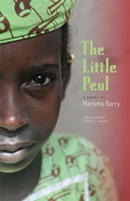

Univ. of Virginia Press, paperback, 9780813929637
The Little Peul, originally published in French in 2000 and translated into English earlier this year, is a debut novel based on the author's childhood as a member of the Peul tribe, a nomadic people that inhabits several countries throughout Africa. The story begins in Senegal, as the young narrator is decorated with jewelry and fitted with a new dress by her mother, and then given a ritual bath. The girl has a premonition that something unpleasant is about to happen, yet she does not fully understand what will be done to her. A woman comes to the house, and brings her and several other girls to a house in the village, where they are forcibly castrated. The girls are scared and in pain, but they are given little emotional support and receive only strict instructions on what they should and should not do.
This opening scene is representative of the lives of girls and women in this community, who are subjected to cultural restrictions and expectations that stunt their development. In addition, the narrator experiences more trials and stresses than other girls in her village. Her mother divorces her husband, and the girl is forced to curtail her schooling and help take care of the household and her siblings. However, she is a strong-willed and forward-thinking young woman who realizes through her reading that she can pursue a life beyond what her parents and culture expect from her. She is able to overcome numerous obstacles, and determinedly pursues the education that serves as her ticket out of the village and into a brighter future.
The Little Peul, which is based on Barry's own experiences in Guinea and Senegal, is a powerful and
instructive novel of a young girl whose determination and will permits her to achieve fulfillment and success
despite the odds stacked against her. Barry's personal narrative of adolescence and adulthood is continued in her
second novel, Le coeur n'est pas un genou que l'on plie, published by Gallimard in 2007 but not yet
translated into English, which describes her education in Senegal and Paris, her future mentors, and her
critique of culturally restrictive societies and their impact on the lives of women.
